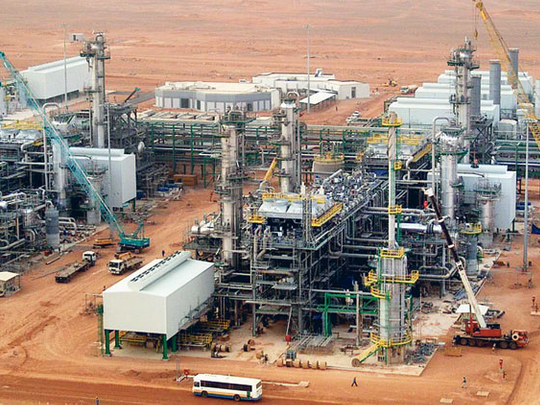
Sirte: At the marina under construction so yachts can moor off Muammar Gaddafi's hometown, the floodlights are switched on even though the mid-morning sun is beating down.
Lights are often left on through the day at Libya's airports, along roads and on construction sites, because this is a country with money to burn: it has about $150 billion (Dh550 billion) in foreign reserves, or $24,000 for every citizen.
Libya is using the cash pile it built up from exporting oil and gas to fund a frenzy of economic development. Foreign businessmen are rushing in to the boom, which is undimmed by the slowdown affecting the rest of the world.
But there is a catch.
Libya may have stopped being an international pariah, renounced banned weapons programmes and dropped the brand of socialism set out in the "Green Book" written by its leader Gaddafi, but it can still be volatile and unpredictable.
It has few clear rules and, analysts say, decision-making often depends on which of Gaddafi's children is in favour: the reform-minded Saif Al Islam, his brother Mutassim, who has ties to the old guard, or one of six other siblings.
A protracted diplomatic row between Libya and Switzerland was a case in point. It began with the brief 2008 arrest of another Gaddafi son, Hannibal, in a luxury hotel in Geneva and led to Libya threatening US business interests and — until late March — withholding visas from most European citizens.
"Libya might have had a point in its row with Switzerland," said Mustafa Fetouri, a Libyan political analyst and professor. But its actions "made every single potential (foreign investor) ask twice about the wisdom of any investment decision".
In the Libyan capital Tripoli, 500km west of Gaddafi's hometown of Sirte, few of the people in the new Radisson Blu hotel seemed concerned.
In the lobby, a European businessman negotiated one deal after another on his mobile phone. Nearby, executives from a US bank handed out their business cards.
These days, it is a typical Tripoli scene. "If you go into a cafe in the morning you'll see people signing contracts," said a Libyan who returned home after living in the United States. "This town is booming," he said.
British retailers Marks & Spencer and Monsoon have opened stores in the city, a five-star Marriott hotel will open next year and workers from south east Asia and sub-Saharan Africa rush to finish shiny new office blocks.
It is not all chic. One weekday afternoon at the Tripoli stock exchange —where Libya's two mobile phone firms are expected to float shares this year —an old woman wearing carpet slippers took a rest on the front steps.
While there are few signs of extreme poverty in Libya — gross domestic product per head is five times higher than in neighbouring Egypt — there is plenty of neglect.
In Tripoli's historic old city, the medina, the walls of some houses have collapsed and there residents dump their rubbish.
Still, Libya is on the move.
Its economy is expected to grow 5.4 per cent in 2010, according to the International Monetary Fund.
United Nations figures show foreign direct investment into Libya rose to $4.1 billion in 2008 from $1.038 billion in 2005.
The government said it had earmarked $150 billion for spending on infrastructure, though the timetable for that is not clear, and is inviting foreign firms to bid for contracts.
Lucrative projects
Oil exporter Libya is making up for years of stagnation by spending billions of dollars on construction projects. These are some of the projects underway in Libya outside oil and gas:
Transport Russian state-owned firm Russian Railways signed a 2.2 million euro contract in April, 2008 to build a 500km railway along Libya's Mediterranean coast between Sirte and Benghazi. In the same year, China Railway Construction Corporation was awarded a $2.6 billion contract to build a railway. Brazilian construction firm Odebrecht, with a Libyan joint venture partner, is building a 24km ring road around Tripoli.
Hotels Marriott International will manage a 370-room hotel in Tripoli due to open next year. The hotel will be in a 36-storey tower being built by South Korea's Daewoo Engineering and Construction in partnership with a Libyan state investment fund. Intercontinental Hotels Group plans this year to open a 351-room hotel in Tripoli with Magna Holdings.
Shopping Malls Istanbul firm Turkmall signed an agreement with Libya's state-run Economic and Social Development Fund to build shopping and entertainment centres: two in Tripoli and one in Benghazi. Turkish Renaissance Construction has been awarded a contract by the Libyan Investment and Development Corporation to build an office, residential and retail complex between Tripoli and the international airport. Turkish company, Summa, says it is building a mall in Benghazi.
Airport Tripoli's international airport is being replaced with two new terminals, complete in March 2011 to handle 20 million passengers per year. The contract was awarded to a consortium of Turkey's TAV Construction, Odebrecht and Athens firm Consolidated Contractors.
Conference Hall Italian construction firm Impregilo has won a 285 million euro contract to build a conference centre outside Tripoli. It is scheduled for completion in 2013, according to the Italian company.
Utilities Austrian builder Strabag was awarded with a 434 million euro contract to modernise water and sewage systems, telephone and electricity lines in Tajura. Impregilo, in partnership with a Libyan investment firm, will carry out similar work in Tripoli and Misurata.












